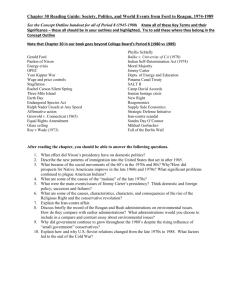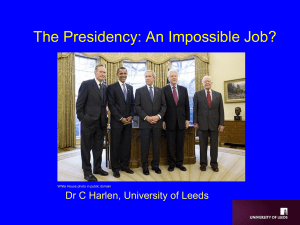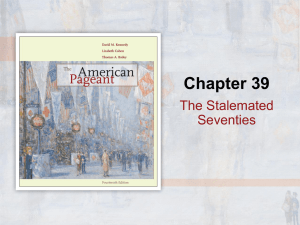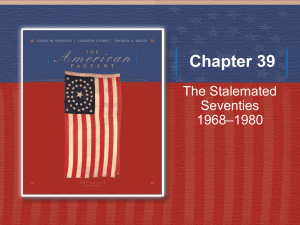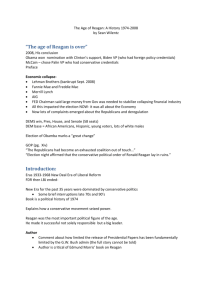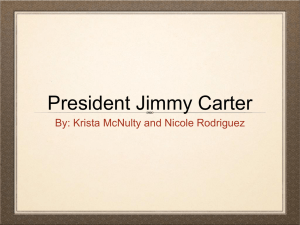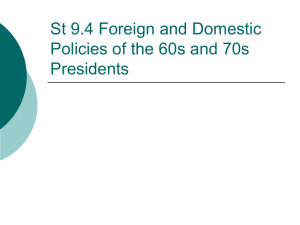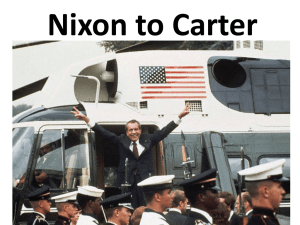Crisis & Resurgence PowerPoint
advertisement
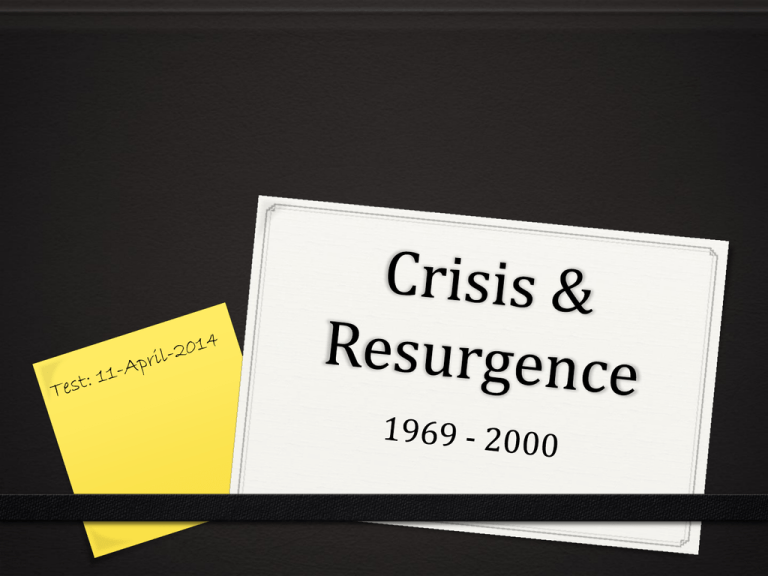
• MINIMUM ½ page per question. • You must have a thesis sentence. • You must ANSWER the question. Must have all to receive credit. Quick Overview O In this unit you will learn about American society in the O O O O last 30 years of the twentieth century. Under President Nixon, the United States withdrew from Vietnam & opened diplomatic relation with Communist China In the 1970s, U.S. prestige suffered from Watergate & the Iran Hostage Crisis Under Presidents Reagan & Bush, America moved toward greater conservatism in government Under President Clinton, Americans saw an end to the Cold War and enjoyed economic prosperity from the growth of the computer industry. What we will go over O Nixon Presidency (1969 – 1974) O Ford Presidency (1974 – 1977) O Carter Presidency (1977 – 1981) O Reagan Presidency (1981 – 1989) O George H.W. Bush Presidency (1989 – 1993) O Clinton Presidency (1993 – 2001) O Achieving the American Dream: Bill Gates, Sam Walton, Estee Lauder, Robert Johnson, & Lionel Sosa Imperial Presidency O U.S. Constitution authors had O O O O attempted to keep balance between the separate branches Since the 1930s: Presidential power had been increasing During the Great Depression, the New Deal gave the President a larger role in managing the economy 2 World Wars & the Cold War added to the President’s role in foreign affairs Unlike Congress, the President can act rapidly & decisively Nixon Presidency (‘69 - 74) O Media (radio & television) increased the President’s O O O O O O ability to appeal directly to voters. Presidents begin relying on their own advisors instead of on Cabinet members- who Congress has to approve. Expansion of Presidential power reached its peak under President Richard Nixon. Failed to consult Congress about the bombing of Cambodia & Laos Used public funds to remodel his private homes Used CIA & FBI to collect information on political enemies When Congress voted for programs he did not like, he simply refused to spend those funds. Domestic Policy O Moved nation in a more conservative direction O Felt Federal social programs were inefficient & they O O O O should & could have been dealt with at a local level Put an end to the draft Create series of strong anticrime laws Advance broad environmental program Inflation O Rising Prices O Trade Deficit O Rising Unemployment O Cut spending on social programs O Took America off the Gold Standard O When these things did not work, he imposed the 1st peacetime wage and price controls O All proved unsuccessful Environmental Protection Agency (EPA) O Sets air & water pollution standards O Engages in monitoring & enforcement activities O New construction must pass through a detailed environmental impact review O Private citizens can file lawsuits against polluters under the EPA Endangered Species Act (1973) O This law requires Fish and Wildlife Service to list species of plants and animals that are threatened with extinction O Must take Further steps to protect these species of plants and animals Equal Rights Amendment (ERA) O 1923: Alice Paul proposes the Equal Rights O O O O O Amendment For almost 50 years, the amendment was introduced in each session of Congress- Failed every time 1972: Approved and sent to the states with a 7 year limit for ratification Deadline extended to 1982, but still fell 3 states short of the support needed for ratification. Phyllis Schlafly: Critic of the Women’s Liberation Movement strongly opposed the act Feared it would deprive the women of the “right” to be “supported & protected” by men O Believed the amendment might lead: O To unisex restrooms O Require women to serve in combat roles Foreign Policy O Nixon believed the President’s most important role was directing the countries foreign policy. O Vietnam: Reduced the number of troops. Increased bombing raids & financial aid to South Vietnam. O China: Re-opened relations in 1972. O Strong Anti-Communist, surprised the world by restoring diplomatic relations with Communist China. Became the 1st American President to visit mainland China. O Greatest Foreign Policy Achievement O Soviet Union: Believed in pursuing a policy of detente: a relaxing of tensions. O Wanted to halt the build up Nuclear Weapons O Became 1st U.S. President to visit Moscow O Signed agreement with Soviet Union leaders, limiting the development of defensive missile systems. O Further agreed to sell American grain to the Soviet Union to help them cope with food shortages O ‘73: War broke out in the Middle East- U.S. & Soviet Union further cooperated in pressuring Israel and the Arab states to conclude a cease-fire The Cover-Up O Tried to cover up an investigation of the Watergate break-in on the grounds of National Security O Two reporters were the first to report possible links between the break-in and the White House. O Senate Appointed a committee to investigate O Attorney General also appointed a Special Prosecutor to examine possible wrong doings. Watergate Tapes O Presidential aide stated that Nixon had participated in O O O O the cover-up Revealed that Nixon secretly recorded all of his own White House Conversations Nixon would not let the Senate Committee listen to the tapes - claimed executive privilege Nixon said Congress had no authority to question members of the executive branch about internal communications United States v. Nixon (1974) Nixon Resigns O Tapes made public O Nixon had in fact lied when he said he was not involved in the cover-up O The House of Representatives moved to impeach Nixon O Fearing removal from office by the U.S. Senate, Nixon became the first and only President to resign. Ford’s Presidency (‘74 - ‘77) O Ford’s main worries were economic ones O Stagflation: High unemployment combined with inflation O Organization of Petroleum Exporting Countries (OPEC): Formed in 1960. Most OPEC members were Arab countries. O 1973: The Arab nations of OPEC used oil as a political weapon by imposing an oil embargo on the U.S. and Western European countries for siding with Israel in the 1973 war. O Helsinki Accords: 1975: The U.S., Canada, Soviet Union, and most European countries signed an international agreement recognizing post-World War II borders & promising respect for human rights Carter’s Presidency (‘77 - ‘81) O Many Americans continued to blame Republicans for the Watergate Scandal O Carter was former Governor of Georgia O Carter was elected as an “outsider” who promised to end corruption and “clean up” Washington Carter’s Domestic Policy O Chief problem at home was the economy O U.S. Depended on imported oil & oil prices continued O O O O to rise! Inflation was more than 10% (this means that in a single year, prices were 10% higher at the end of the year than they were at the beginning). Interest rates were 20% Unemployment stayed high Carter pushed through Congress the Community Reinvestment Act (1977), which required banks to make credit available in poor communities, preventing the decay of low-income neighborhoods in the inner city Carter’s Domestic Program O The Energy Crisis: created the Department of Energy. Also increased the oil in the nation’s “Strategic Petroleum Reserve.” Sought special tax on large automobiles, and the power to ration gas, but Congress denied him those powers. O Stagflation: Inflation & Interest rates soared in 1979 (partly due to the oil crisis). Cut Federal spending, but inflation didn’t come down until 2 years later during the Reagan Presidency. Carter’s Domestic Program O The Environment: Provided funds to clean up toxic dumpsites. Following an accident at the Three Mile Island nuclear reactor in 1979, Carter created the Nuclear Regulatory Commission to develop stricter standards for the peaceful use of nuclear energy. O Diversity: Carter appointed women and minority members to government posts. He also sponsored a bill requiring public schools to provide instruction to students in their native language while trying to learn English. Carter’s Foreign Policy O Wanted the U.S. to set a moral example O Human rights a high priority: condemned apartheid in South Africa, pressured the Soviet Union to allow its Jews to emigrate, & cut aid to dictatorships that violated human rights O The Panama Canal Treaty (1977): Returned control of all of the Canal Zone, except the canal itself, to Panama. U.S. further agreed to turn over the canal to Panama by the end of the century. Carter’s Foreign Policy O Camp David Accords (1977): Egypt & Israel had fought one another in a series of wars since the creation of Israel back in 1948. Carter invited Andrew Sadat (Egypt’s President) & Menachem Begin (The Prime Minister of Israel) to the Presidential retreat at Camp David in Maryland. After the face-to-face negotiations, an agreement between the two leaders was reached. Israel agreed to return the Sinai Peninsula to Egypt (which had been taken during the was in 1967). In exchange, Egypt offered a peace treaty and the establishment of normal diplomatic relations with Israel (ending a 30 year war). Carter’s Foreign Policy O U.S./ Soviet Relations: Initially continued Nixon’s détente. 1979 Soviets invade Afghanistan. This aggressive act brought a temporary end to détente. Carter halted grain sales, boycotted the 1980 Olympics in Moscow, & postponed ratification of a new arms control agreement (SALT II) Carter’s Foreign Policy O The Iranian Revolution & Hostage Crisis: The Shah of Iran was an ally to the U.S. He was also a brutal dictator to his opponents. He had promised freedoms that never came. After widespread demonstrations started to break out against the Shah (1978) - he fled the country (1979). Ayatollah Khomeini & religious leaders took control. These Fundamentalist Shiite Muslims were generally hostile to Western influence. Resented America for helping the Shah and backing Israel. O October, 1979: the Shah enters the U.S. for medical treatment. 2 weeks later the U.S. embassy in Tehran, Iran is seized. The hostages were blindfolded, tied up and accused of working for the CIA. Days dragged into weeks and weeks into months. The embassy staff was held hostage for more than 1 year. O U.S. imposed economic sanctions on Iran & other countries supported the U.S. (America’s image still suffered because of our inability to free the hostages.) O Negotiations finally led to their release on the day that Jimmy Carter left office and Ronald Reagan became President.

